|
#2
20th August 2015, 12:02 PM
| |||
| |||
| Re: Syllabus of B Ed Punjab University Chandigarh
As you want to get the syllabus of B.Ed of Punjab University Chandigarh so here is the information of the same for you: COURSE CONTENTS UNIT-I EDUCATION−NATURE, AIMS AND ROLE IN THE MODERN CONTEXT (a) Concept of Education : Indian and Western. (b) Types of Education : Formal, Informal and Non-formal and Role of Home, School and Society in Education. (c) NPE (1986) with reference to POA (1992). UNIT-II PHILOSOPHY : SCHOOLS AND THEIR EDUCATIONAL IMPLICATIONS (a) Concept, nature and functions of Philosophy and Educational Philosophy. Relationship between Philosophy and Education. (b) Impact of Idealism, Naturalism and Pragmatism on Education. (c) Contribution of Gandhi, Tagore and Aurobindo to educational thought and practice. UNIT-III EDUCATION AND SOCIOLOGY (a) Concept of Sociology and relationship between Sociology and Education. (b) Educational provisions in the Constitution of India. (c) Education for Democracy, National Integration, International understanding and Globalization. UNIT-IV CULTURE AND VALUE-EDUCATION (a) Culture, Concept, Characteristics and its Interaction with Education. (b) Values : Concept, Types and Sources. (c) Role of Teachers and Strategies in inculcating values among Students; Code of Conduct for Teachers. UNIT-V NEW TRENDS IN EDUCATION (a) Human Resource Development : Concept, need and role of education in HRD. (b) Human Rights : Brief historical background with special reference to Universal Declaration of Human Rights; Latest Human Rights Act in Indian Legislation and Role of Education in promoting Human Rights. (c) Distance Education : Concept, need and modes; e-education : concept. BOOKS SUGGESTED: 1. Bhatia, K.K. and Narang, C.L., Teacher and Education in Emerging Indian Society, Ludhiana: Tandon Publishing, 1992. 2. Biswal, U.N., Philosophy of Education, New Delhi : Dominant Publishers and Distributors, 2005. 3. Blake, N., Smeyers, P Smith, R. & Standish, P., The Blackwell Guide to the Philosophy of Education, USA : Blackwell Publishing, 2003. 4. Brubacher, John S., Modern Philosophies of Education, New Delhi : Tata McGraw Hill, 1969. 5. Chaube, S.P., Philosophical and Sociological Foundations of Education, Agra : Ravi, Noudarnalya, 1981. 6. Dash, B.N., Theories of Education & Education in the Emerging Indian Society, New Delhi : Dominant Publishers and Distributors, 2004. 7. Dev, Nathan, Globalization and Indigenous People in India, 2004. 8. Dewey, John, Democracy and Education, New York : Macmillan Company, 1961. 9. Goel, A. & Goel, S.L., Human Values and Education, New Delhi : Deep & Deep Publications Pvt. Ltd., 2005. 10. Goff, Phil, Test Your E-Sills, London : Hobler & Stoughton, 2001. 11. Halsey, A.H., Lander, H., Brown, P. & Nells, A.S., Education : Culture, Economy and Society, New York : Oxford University Press, 1997. 12. Howard, Om on and Sam, Carner, Philosophical Foundation of Education, Columbus : Charles E., Merril, 1976. 13. Humayun, Kabir, Indian Philosophy of Education, Bombay : Asia Publishing House, 1961. 14. Joshi, Kireet, A National Agenda for Education, Delhi : The Mothers' Institute of Research, 2000. 15. Joshi, Kireet. Education at Corssroads Delhi : The Mother's Institute of Research, 2000. 16. Lynch, Marguerita, Mc Vay, The Online Educator, London : Routledge Falmer, Taylor and Fancis Group, 2002. 17. Madhukar, Indira, Internet-based Distance Learning, New Delhi : Authorspress, 2005. 18. Mathur, S.S., Philosophical and Sociological Foundations of Education, Agra : Vinod Pustak Mandir, 1997. 19. Mathur, S.S., Sociological Approach to Indian Education, Agra : Vinod Pustak Mandir, 1985. 20. Mohanty, J., Indian Education in the Emerging Society, New Delhi : Sterling Pvt. Ltd., 1994. 21. Naseema, C. & Alam, M.A., From Blackboard to the Web, New Delhi : Kanishka Publishers, Distributors, 2004. 22. National Council of Teacher Education, Gandhi on Education, New Delhi : NCERT, 1998. 23. NCERT, Education and National Development : Report of the Education Commission, New Delhi, NCERT, 1964-66. 24. O' Connor, D.J.O., An Introduction to Philosophy of Education, London : Routledge, 1957. 25. Pandey, R.S., National Policy of Education, Allahabad : Horison Publishers, 1992. 26. Patil, U.T., Virtual Education, Delhi : Authorpress, 2002. 27. Puri, M. & Abraham, G. (ed.), Handbook of Inclusive Education, New Delhi : Sage Publications, 2004. 28. Rao, V.K., Handbook of Modern Methods of Teaching, Delhi : Rajat Publications, 1999. 29. Rao, V.K., Trends in Education (Volume I), Delhi : Rajat Publications, 1999. 30. Rao, V.K., Trends in Education (Volume II), Delhi : Rajat Publications, 1999. 31. Rao, V.K., Trends in Education (Volume III), Delhi : Rajat Publications, 1999. 32. Salmon, Gilly, e-activities, London : Kogan page , 2002. 33. Satija, B.R., Trends in Education, New Delhi : Anmol Publications Pvt. Ltd., 2003. 34. Sodhi, T.S. and Suri Arun, Issues in Education and National Development, Patiala : Bawa Publishers, 1999. 35. Sodhi, T.S., A Text Book of Trends in Education, Patiala : Bawa Publishers, 1996. 36. Sodhi, T.S. and Suri Arun, Philosophical and Sociological Foundations of Education, Patiala : Bawa Publishers, 1998. 37. Srivastava, D.S., Sharma, S.K. & Kumari, S., Handbook of Education, New Delhi : Shree Publishers & Distributors, 2004. 38. Stromquist, Nelly P., Education in a Globalized World, New York : Rowman & Little Field Publishers, Inc., 2002. 39. Taneja, V.R., Educational Thought and Practice, New Delhi : Sterling Publishers, 1987. 40. Talesra, H., Marashdeh, W. & Nagda, M.L., Web-based Learning, Delhi : Authorspress, 2003. 41. Tiwari, M.D., Education and e-governance, Delhi : Macmillian, 2001. 42. Trivedi, P.R. (ed.), Global Education : An Analysis, 1994. 43. Yadav and Yadav, Education in Emerging Indian Society, Ludhiana : Tandon Publications, 1986. PAPER-II : THE LEARNER−NATURE AND DEVELOPMENT: COURSE CONTENTS : UNIT-I (a) Educational Psychology – Nature, Scope and Importance. (b) Growth and Development – Concept, Principles, stage of adolescence period with special reference to issues of stress and strain. (c) Heredity and Environment - Concepts, Laws and their role in growth and development of an individual. UNIT-II (a) Intelligence – Meaning, theories of intelligence (unitary, Spearman's, Thorndike's, Thurstone's and Guilford’s), measurement of intelligence (classification of tests and description of any two tests from each category : Verbal, Non-Verbal, Performance tests), uses and limitations of intelligence tests. (b) Emotional Intelligence : Concept, characteristics and role of teacher in promoting emotional intelligence. (c) Creativity – Concept, characteristics and identification of creative potential, educational programmes for developing creativity. UNIT-III (a) Learning – Meaning, factors affecting learning. (b) Theories of Learning – Trail and error, classical conditioning, Kohler's insight theory, Transfer of Learning : Meaning, types and educational implications. (c) Motivation – Concepts, types and techniques for enhancing motivation. UNIT-IV (a) Personality – Concept, types and trait theories, determinants, assessment. (b) Mental Health - Concept, importance and development of good mental health among learners. (c) Adjustment - Concept and role of teacher in the process of adjustment. UNIT-V (a) Children with special needs : Meaning, Types : Gifted, Delinquents, Educationally Backward Children and their educational programmes. (b) Elementary Educational Statistics – Meaning, uses and measurement of central tendency (mean, median, mode), standard deviation, measurement of correlation by rank difference method. PRACTICAL WORK Administration and interpretation of any two psychological tests, selecting one from each group mentioned below : (a) Learning, Intelligence/Emotional intelligence. (b) Personality, Adjustment, Mental Health. BOOKS SUGGESTED: 1. Chauhan, S.S. (2002), Advanced Educational Psychology, New Delhi : Vikas Publishing House. 2. Clifford Morgan and Kind, R.R., Weise John (1999), Introduction to Psychology, New Dethi : Tata McGraw Hill. 3. Dandapani, S. (2000), A Textbook of Advanced Educational Psychology, New Delhi: Anmol Publications. 4. Dash, M. (2000), Education of Exceptional Children, New Delhi : Atlantic Publishers and Distributors. 5. Dececco, John P. and Crawford, William, R. (1988), Psychology of Learning and Instructions, New Delhi : Prentice Hall. 6. Garret, H.E. (1981), Statistics in Psychology and Education, Bombay : Vakils, Feffer and Simons. 7. Gupta, Sneh (1985), Mental Hygiene and Education, Ludhiana : Parkash Brothers, 8. Heward and Orlansky (1992), Exceptional Children, New York : Maxwell Macmillan International. 9. Kakkar, S.B. (2001), Educational Psychology, New Delhi, Prentice Hall of India. 10. Kirk Samuel (1997), Educating Exceptional Children, New York, Houghton Mifflin Company. 11. Mangal, S.K. (2002), Advanced Educational Psychology, New Delhi : Prentice Hall of India. 12. Maslow, A.H. (1970), Motivation and Personality, 2nd Ed., New York: Harper & Row. 13. Panda, K.C. (2001), Education of Exceptional Children, New Delhi: Vikas Publishing House Pvt. Ltd. 14. Sahu, Binod Kumar (2002), Education of Exceptional Children, Ludhiana: Kalyani Publishers. 15. Sidhu, Kulbir Singh (1998), Statistics in Education and Psychology, Jalandhar : International Publishers. 16. Tiwari, Govind and Pal Rama (1997), Experimental Psychology : A Dynamic Approach, Agra, Vinod Pustak Mandir. 17. Verma, Preeti and Srivastava, D. N. (1996), Modern Experiment of Psychology, Agra : Vinod Pustak Mandir. 18. Woolfork, Anita (2004), Educational Psychology : Reason Education (Singapore), New Delhi : Indian Branch. Paper III : TEACHING LEARNING PROCESS: COURSE CONTENTS : UNIT-I : TEACHING AND LEARNING (a) Concept of teaching and learning, relationship between teaching and learning. (b) Principles of teaching. (c) Levels and Phases of teaching. (d) Mass Media - Meaning, Purpose, Role of teacher in making the use of mass media in education. UNIT-II : EDUCATIONAL TECHNOLOGY (a) Meaning, importance and Types of Educational Technology. (b) Models of teaching: Meaning, Assumptions and Fundamental Elements of a Model of Teaching. (c) Suchman's Inquiry Training Model. (d) Flander's Interactional Analysis System. UNIT-III : INNOVATIONS IN EDUCATIONAL TECHNOLOGY (a) Micro Teaching — Concept, Process, Merits and Demerits (b) Skills of Micro Teaching - Introducing the Lesson - Fluency in questioning - Explaining - Stimulus Variation - Reinforcement (c) Programmed Learning — Concept, Principles and Types of Programmed Learning. (d) CAI - Concept and Importance UNIT-IV : CURRICULUM AND CLASS-ROOM PROBLEMS (a) Curriculum — Concept and principles of curriculum construction. (b) Classroom problems - Meaning and Nature. – Types of Classroom problems. – Solutions of Classroom Problems. (c) Classroom Communication — Concept, Barriers and Remedial measures. (d) Action Research — Meaning, goals and steps in action research. UNIT-V: TRENDS IN EVALUATION (a) Concept and Principles of Measurement and Evaluation. (b) Defects in External Examination with Reference to Secondary Education in Indian context. (c) Characteristics of a good tool of Evaluation. (d) Recent trends in Examination Reforms Grading System. - Semester System - Continuous Internal Evaluation BOOKS SUGGESTED: 1. Aggarwal, R.N. & Bipin Asthana, Educational Measurement & Evaluation, Agra:Vinod Pustak Mandir, 1983. 2. Anand Bhushan & Ahuja, Educational Technology, Patiala: Bawa Publishers, 1992. 3. Apter, Michel, J., The New Technology of Education, London : MacMillan, 1968. 4. Bhatia, K.K., Narang, C.L. & Sidhu, H.S., Foundations of Teaching Learning Process, Ludhiana: Tandon Pub. 1994. 5. Chauhan, S.S., A Textbook of Programmed Instruction, New Delhi : Sterling, 1978. 6. Dececco, John, P., Educational Technology, Reading in Programmed Instruction, Holt Rinehart and Winston, 1964. 7. Joyce, Bruce and Marsha Wali., Model of Teaching, New Delhi : Prentice Hall of India, 1985. 8 Mangal, S.K., Fundamental of Educational Technology, Ludhiana: Parkash Brothers, 2002. 9. Richmond, Menneth, The Teaching Revolution, London : Methuen & Co., 1969. 10 Ruheia, S.P., Educational Technology, New Delhi: Raj Prakashan, 1973. 11 Sampath, K. and Others, Introduction to Educational Technology, New Delhi : Sterling Pub. Ltd., 1984. 12. Sharma, R.A., Shikshan Takniki, Meerut : Modern Publishers, 1977. 13 Sharma, R.A., Educational Technology, Meerut : Modern Publishers, 2004-05. 14 Singh, L.C., Sharma, R.D., Micro Teaching, Agra : Bhargwa Book House, 2002. 15 Sodhi, G.S. & Others., Teaching Learning-A Process Approach. Chandigarh: Samir Publishers, 1994. Paper IV (Part A): SCHOOL MANAGEMENT: COURSE CONTENTS UNIT-I: ORGANIZATION AND MANAGEMENT (a) School as Organization: Meaning, objectives, need, scope, types and principles of school organization, administration and management. (b) School Plant: importance, Essential characteristics, selection of site and optimum Utilization & Maintenance of different School Components. (c) Institutional Planning: Meaning, objectives, advantages and characteristics of Institutional planning. Preparation of an institutional plan. Unit-II : ESSENTIAL FACETS OF SCHOOL ORGANIZATION (a) Leadership: Concept, Need & Development of Leadership Qualities among students. Qualities and functions of Head of the Institution. (b) School Time Table: Importance, types and principles of time table. (c) Discipline, Concept, Bases of Discipline Causes of indiscipline and its remedial measures. Unit-III: MAJOR FACTORS FOR QUALITATIVE IMPROVEMENT (a) Inspection and Supervision: Meaning & Difference, Aims, principles, area & types and procedures of supervision. Modern trends in supervision. (b) School Records and Registers: Importance, types and essential requirements of School records. Mode of keeping and maintaining school records. (c) Co-curricular Activities: Meaning, importance and types of activities. Principles of organizing co-curricular activities. Problems in organizing co-curricular activities. BOOKS SUGGESTED: 1. Bhatia, K.K. and Singh, Jaswant, Principles & Practice of School Management, Ludhiana: Tandon Publication, 2002. 2. Bhatnagar, R.P. & Verma, I.B., Educational Administration at College Level, Meerut: Loyal Book, 1978. 3. Dash, B.N., School Organisation Administration & Management, Neel Kamal Publications Pvt. Ltd., 1996. 4. Mohanty, J., Educational Administration, Supervision and School Management, New Delhi: Deep and Deep Publications, 1990. 5. Mathur, S.S., Educational Administration and Management, Ambala Cantt:The Indian Press, 1990. 6. Paul Hersey & Kenneth, H. Blanchard, Management of Organizational Behaviour, New Delhi: Prentice-Hall Pvt. Ltd., 1996. 7. Sachdeva, M.S., School Management, Ludhiana: Bharat Book Centres, 2001. 8. Sharma, R.A., School Management, Surya Publications, Meerut, 2005. 9. Sodhi, T.S. & Swi Anaina, Management of School Education, Patiala: Bawa Publication, 2000. PAPER -IV (PART-B) : COMPUTER EDUCATION: UNIT-I (a) Computer Revolution - Its applications in various fields. (b) Generations of Computer (c) Classification of the Computers. (d) Computer Hardware: Input-Output Devices, Memory: Primary & Secondary. UNIT-II (a) Characteristics of various computer languages : MLL/Assembly/HLL/4GLs (b) Introduction to: (i) Operating Systems. (ii) Compiler and interpreter. (c) Features of applications Software (i) Word Processor (ii) Spreadsheets (iii) Presentations (iv) Data Base Management System (d) Lesson Planning: Need & importance of lesson planning in Computer teaching. Characteristics of a good computerized lesson plan. PRACTICAL: (a) MS Windows: (Introduction, Parts, Start Menu, Task Bar settings, Application and document window, anatomy of window, Windows Explorer, desktop, icons, screen saver & settings). (b) Use of following packages for processing word, evaluating numerical values & creating presentations (MS Word, MS Excel, MS Powerpoint). (c) Internet Surfing, Working with E-mail & chat. (d) Soft copy of lesson plan should be made in power-point BOOKS SUGGESTED: 1. Rajaraman, Fundamental of Computers, New Delhi, Prentice Hall of India Pvt. Ltd. 2. Sinha, P. K., Computer Fundamentals, New Delhi, BPB, 1992. 3. Sharma, Lalit, Computer Education, Ferozepur Cantt., Wintech Publications, 2006. 4. Khushvinder Kumar, Sunil Kumar, GBD Publications, Gurusar Sadhar, 2004. 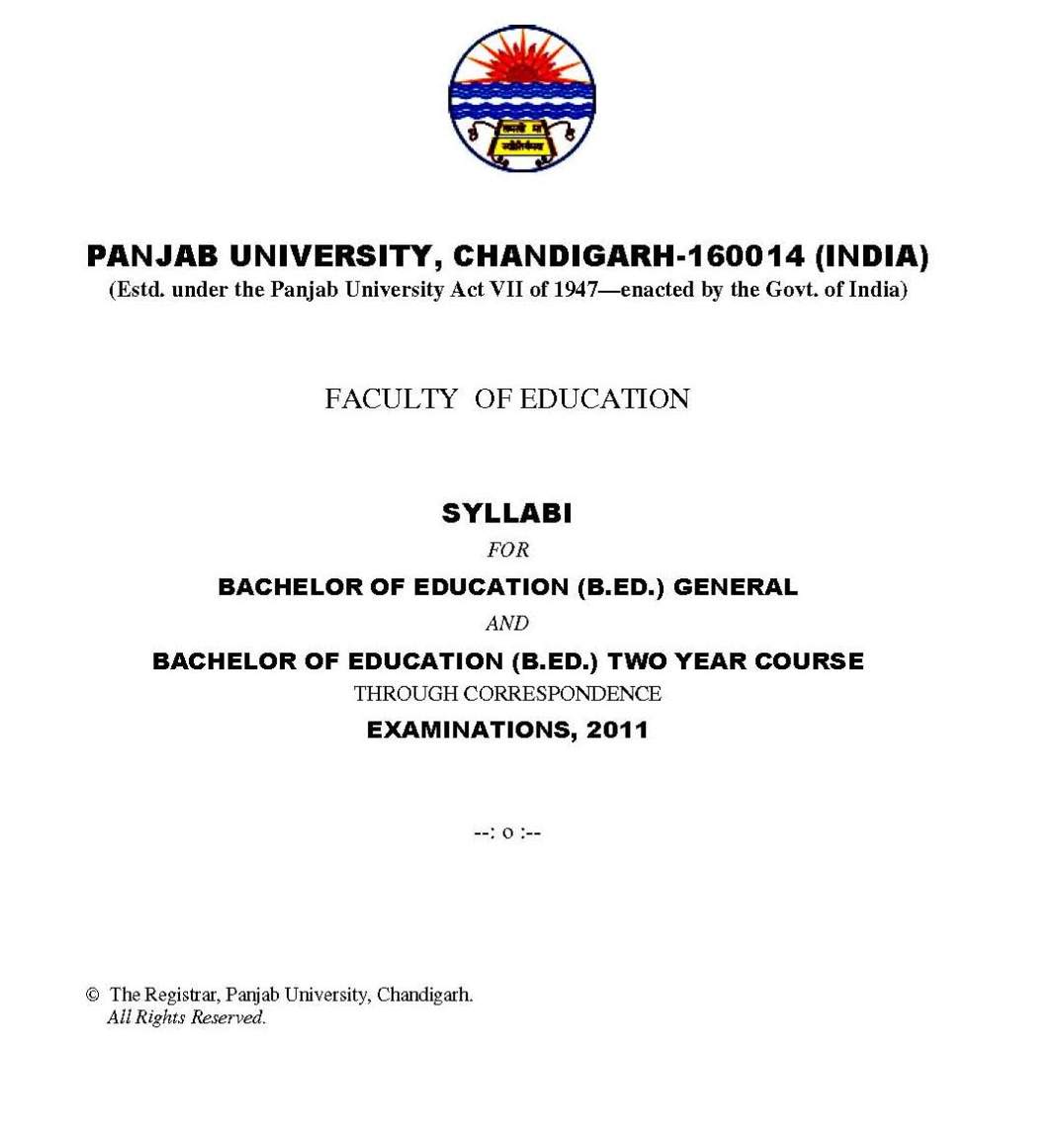 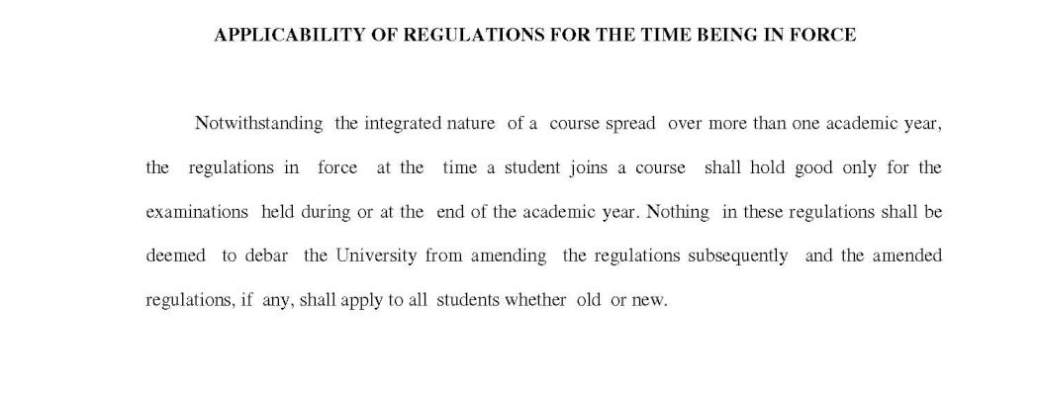 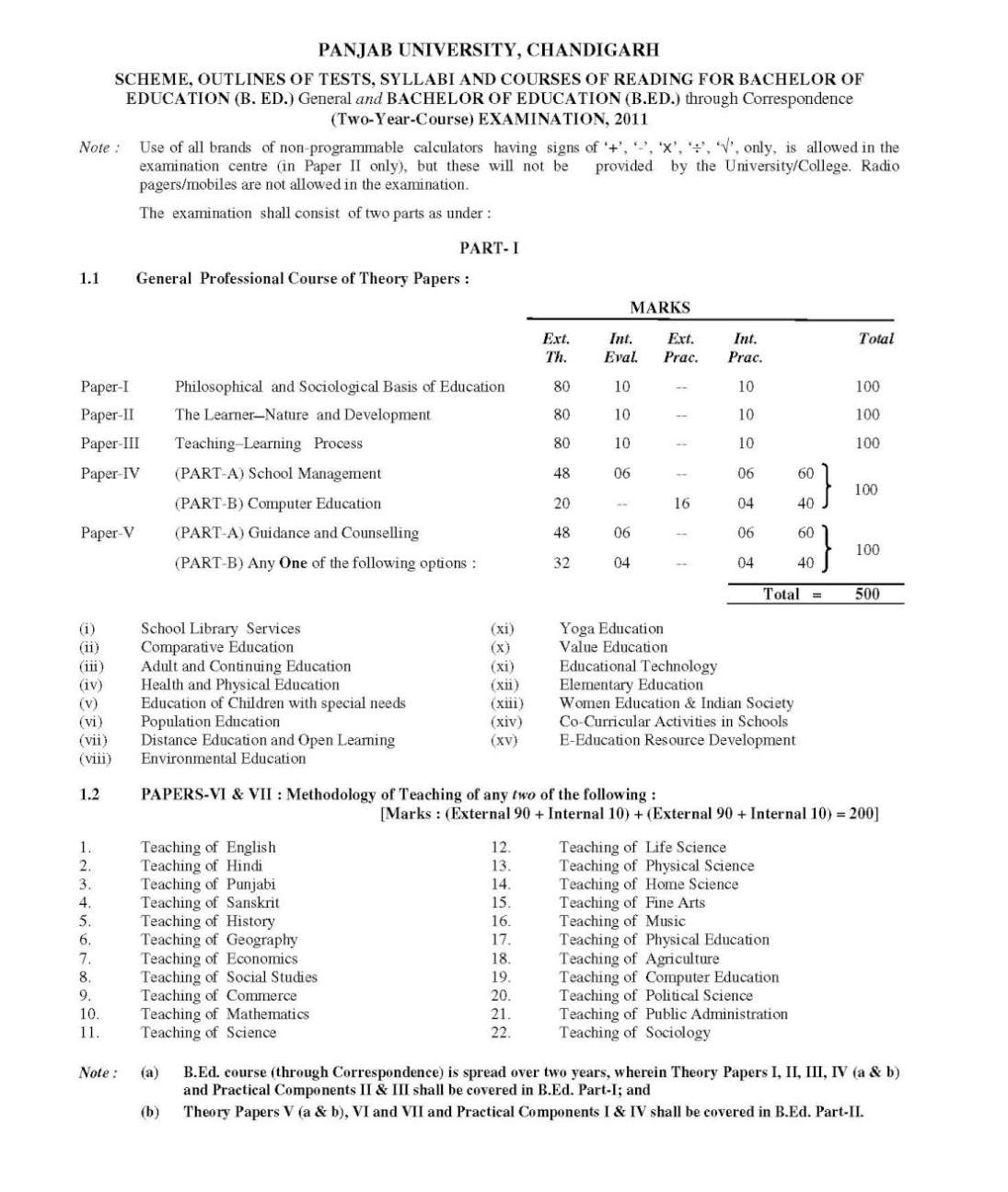 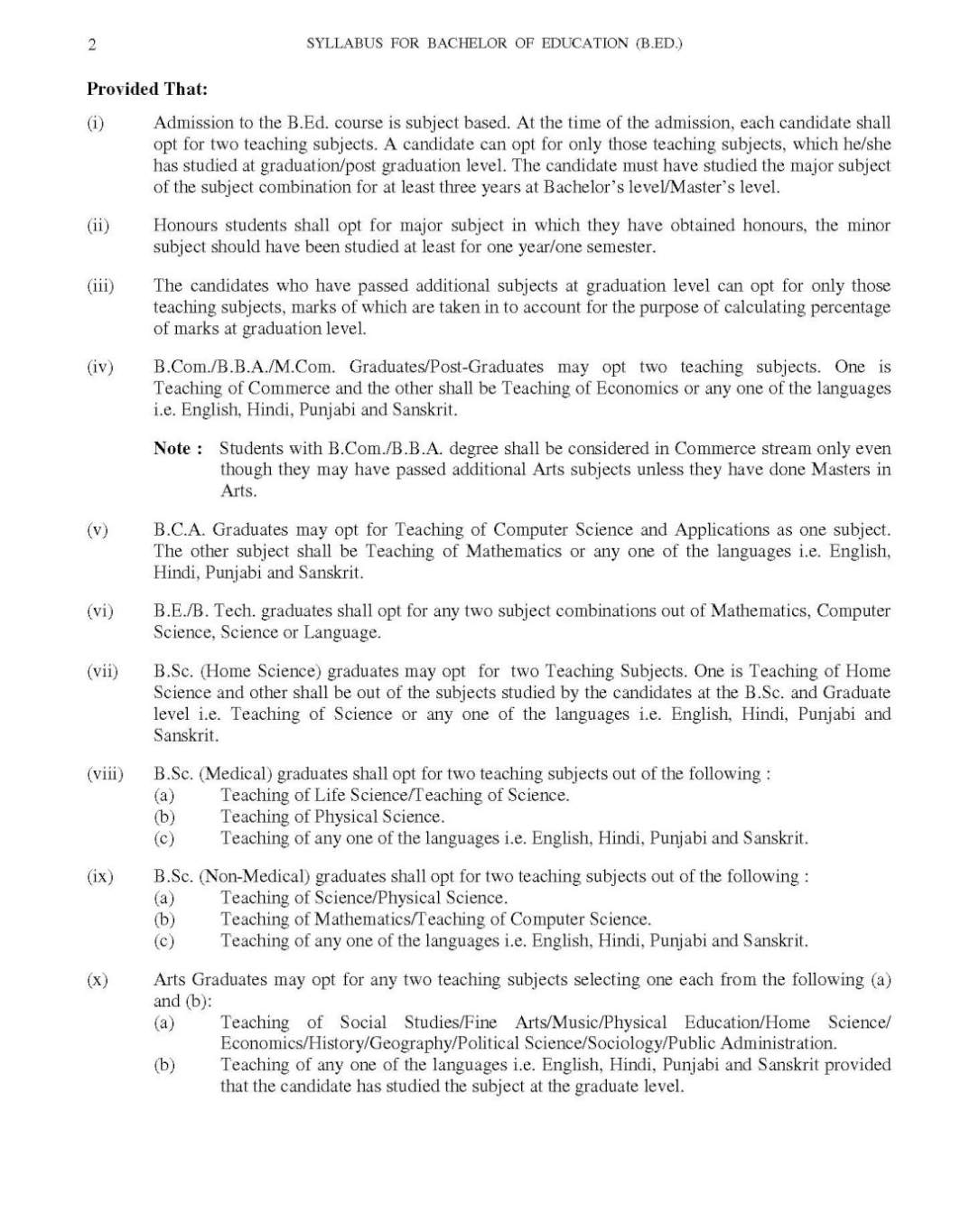 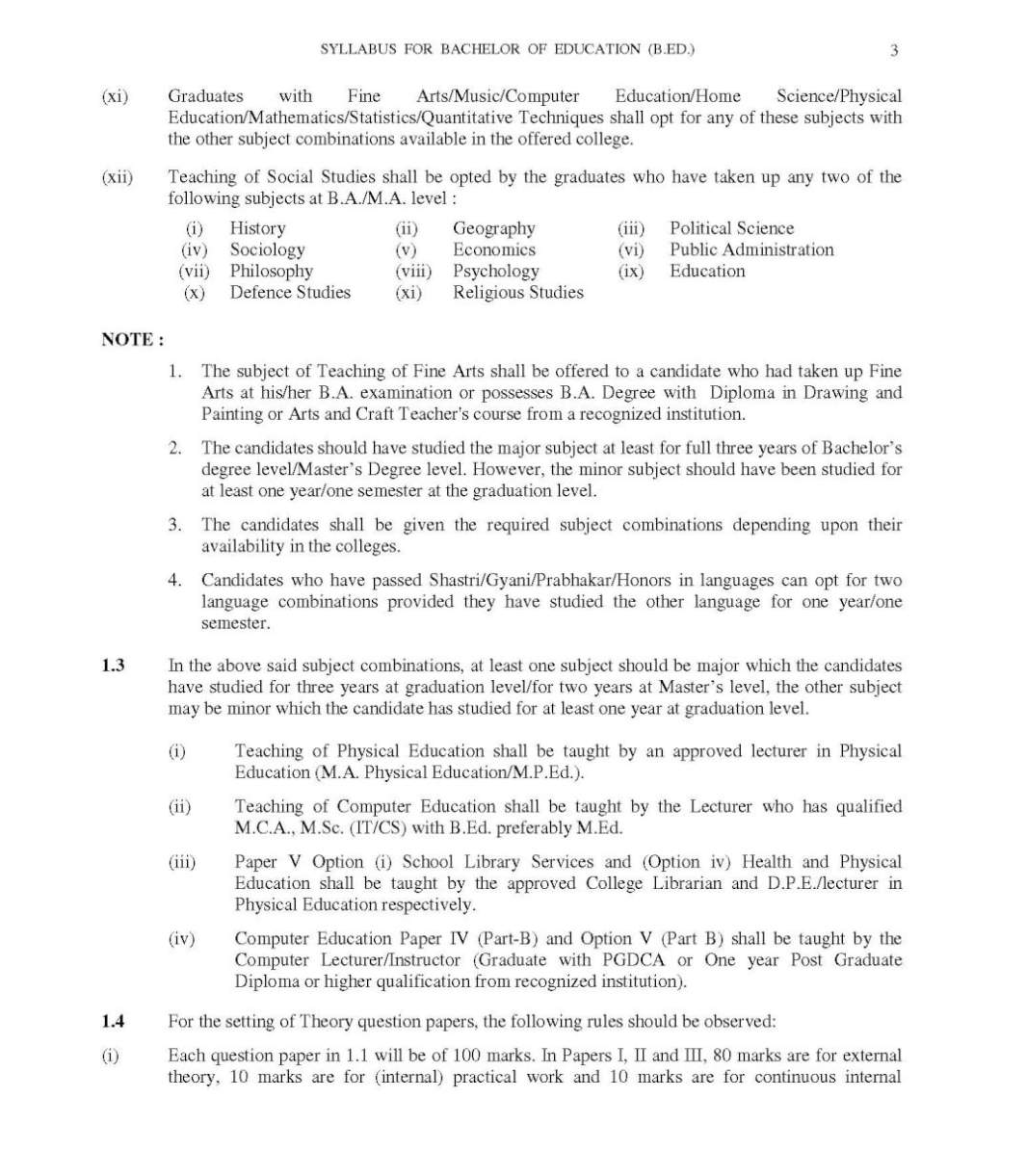 For more detailed information I am uploading a PDF file which is free to download: Contact Details: Panjab University Chandigarh Sector 14 Chandigarh, 160014 India Map Location: [MAP]Panjab University Chandigarh[/MAP] |